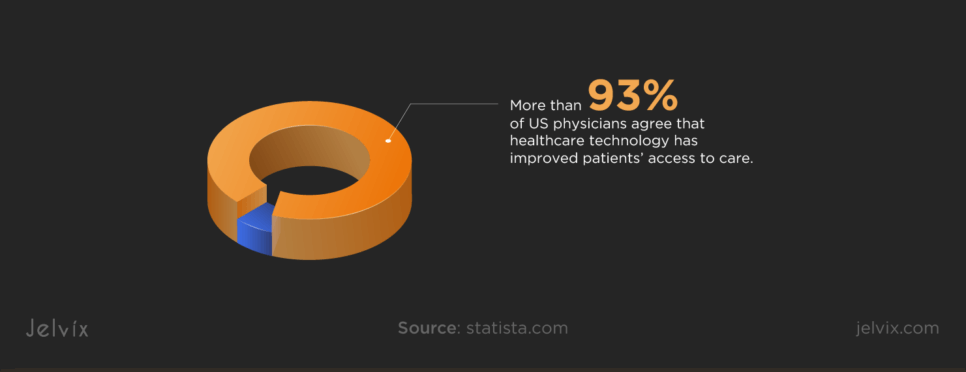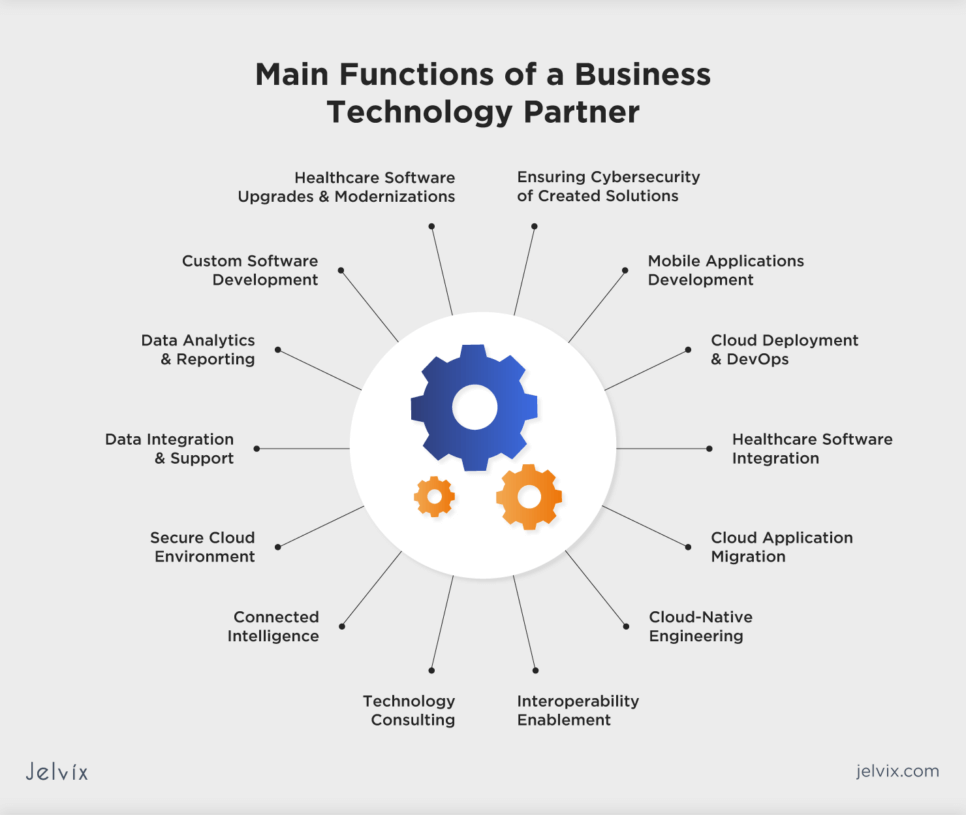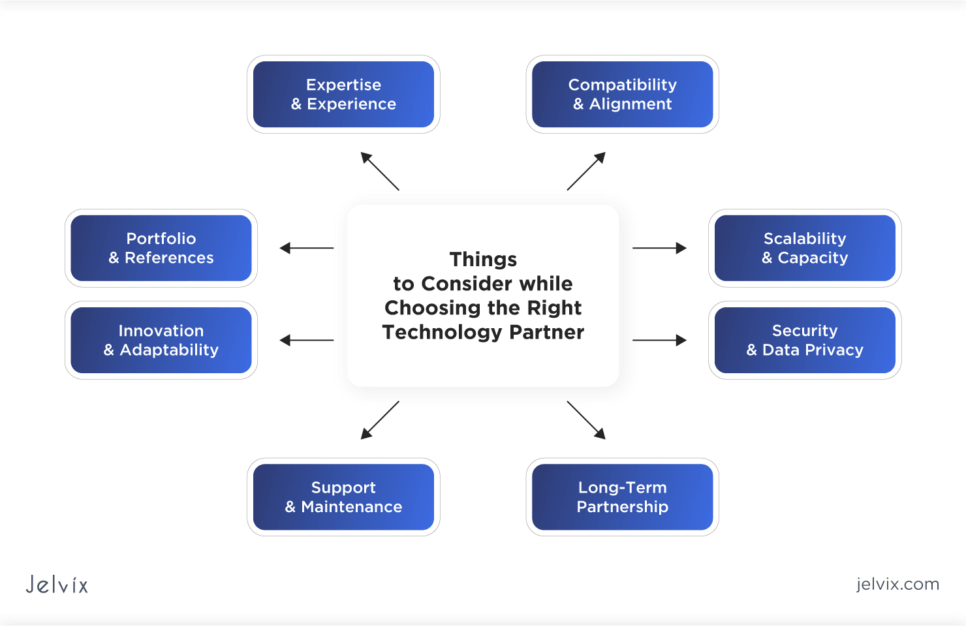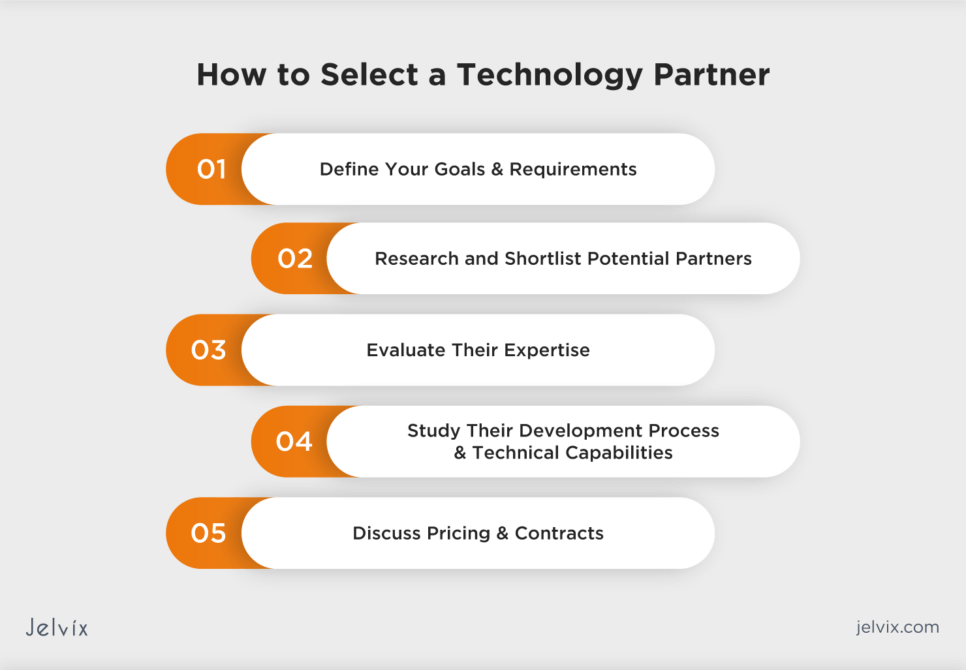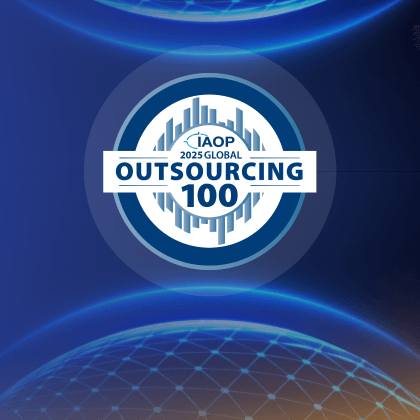In the rapidly evolving world of healthcare, the role of technology is more critical than ever before. According to the report, more than 93% of physicians in the US agree that technology in healthcare has improved patients’ access to care. 77% of respondents report that tech contributed to time efficiency for doctors and patients.
To stay competitive, businesses need to promptly develop custom healthcare solutions that require huge workforce resources. However, the challenges of team training, the high costs associated with custom development, and the hurdles of time zone differences for employees can be overwhelming.
It means that healthcare providers and health information technology vendors need to make a strategic decision to find a technical partner able to guide them through a complicated process of software development.
If you are aiming to develop a new health tech solution or improve an existing one, read this guide. The Jelvix team will navigate you through the process of choosing a partner or contractor who corresponds to your business needs.
What a Technology Partner Is and Why You Need One
A technology partner is an individual or organization that collaborates with another entity to provide technological solutions, expertise, and support. These partnerships serve to create custom healthcare solutions addressing the unique user needs within the healthcare industry.
Technology partnerships can perfectly complement your business if chosen carefully. The advantages may include:
- Enhancing business model by providing technical tools that amplify its capabilities;
- Accelerating project development by offering the expertise of their dedicated team;
- Adding value to your product or service, enhancing its competitiveness;
- Agile technical support that can swiftly address technical issues;
- Saving in-house development costs by outsourcing software development;
- Infusing your business with innovative technologies and keeping you informed about industry trends.
The choice of a technology partner depends on an organization’s specific needs, objectives, and the nature of the projects or initiatives they wish to undertake. A successful technology partnership involves effective collaboration, a shared vision, and a commitment to achieving mutual goals.
Main Functions of a Business Technology Partner
Tech partners go beyond mere assistance. They take on the entire technological facet or a specific part of it ensuring a seamless integration of innovative solutions in healthcare. The key functions of a tech partner encompass a wide range of services and support, such as those we described below.
Product Engineering
Product engineering in healthcare tech development involves the end-to-end process of creating innovative and efficient solutions to address the specific needs and challenges within the healthcare industry. It encompasses a range of services aimed at designing, developing, and maintaining cutting-edge healthcare software.
Software Upgrades, Technology Integrations, and Modernization
Tech partners update healthcare organizations through software upgrades and system modernization, ensuring competitiveness and efficiency to deliver optimal patient care.
Custom Software Development
Healthcare custom software development tailors solutions to the specific needs of providers. Understanding client workflows, objectives, and challenges ensures the creation of software that improves operational efficiency, data management, and patient care.
Mobile Development
Mobile apps offer convenient accessibility. Product engineering extends to the development of mobile apps for iOS, Android, and cross-platform environments. These apps may include patient engagement tools, telemedicine solutions, and other features that facilitate healthcare delivery.
Data Analytics and Reporting
Data-driven decision-making is central to modern healthcare. Tech partners assist in collecting, analyzing, and interpreting data to extract valuable insights. They leverage advanced analytics tools and methodologies to uncover trends, patterns, and opportunities within the data.
Technology Consulting
Tech partners offer expert guidance on technology strategy, solution selection, and implementation. This function helps healthcare providers make informed decisions, optimize their technology investments, and navigate the complex landscape of healthcare technology.
Building from scratch
Creating tailored solutions from the ground up is a unique strength of tech partners. In healthcare, this involves developing custom software and applications designed to meet the specific needs and challenges of providers.
Data Integration and Support
Tech partners provide ongoing support to ensure everything runs smoothly. This includes troubleshooting issues, addressing concerns, and making necessary adjustments to optimize the performance of integrated technologies.
Healthcare Software Integration
Tech partners assist in identifying and deploying the most suitable software solutions, enabling healthcare organizations to adapt to changing market demands and maintain a cutting-edge advantage. This function ensures that healthcare providers deliver high-quality care efficiently and meet the ever-evolving needs of patients and stakeholders.
Interperobility Enablement
Efficient interoperability is a critical aspect facilitated by tech partners. It ensures seamless communication and data exchange between different healthcare systems. This enables healthcare organizations to achieve a cohesive and integrated digital infrastructure.
Engineering and Rationalization
Tech partners engage in the engineering and rationalization of healthcare software, optimizing its performance and structure. This process involves refining software architecture, eliminating redundancies, and enhancing overall system efficiency.
Secure Cloud Environment
When healthcare applications transition to the cloud, tech partners ensure that sensitive healthcare information is moved securely. This process not only enhances accessibility and data sharing but also minimizes infrastructure costs.
Cloud Application Migration
Transitioning healthcare applications to the cloud offers scalability, flexibility, and cost-efficiency. Tech partners facilitate this migration, ensuring that critical healthcare data and applications are securely moved to cloud environments.
Cloud Deployment & DevOps
Tech partners use cloud deployment and DevOps to boost system stability, streamline deployment, and enhance efficiency. This ensures quicker development cycles and robust healthcare applications, readily available for seamless use.
Cloud-Native Engineering
Cloud-native engineering empowers organizations to fully embrace the benefits of cloud computing. Tech partners help businesses adopt cloud-native engineering principles and seamlessly adapt their solutions to meet rapidly changing demands.
Connected Intelligence
Connected intelligence refers to the ability of systems and applications to gather, analyze, and share data seamlessly, leading to more informed and intelligent decision-making.
Ensuring Cybersecurity of Created Solutions
Healthcare organizations are prime targets for cyberattacks, making cybersecurity a top priority. Tech partners take responsibility for building and maintaining robust cybersecurity measures, safeguarding patient data, and ensuring compliance with stringent regulations like HIPAA.
As a tech support partner with years of experience, we believe that cybersecurity is crucial in preserving patient trust and data integrity. At Jelvix, we know how to provide technical support to our clients. We ensure the resilience of our systems against ever-evolving cyber threats across our 50+ healthcare projects.
Reasons for Businesses to Find a Healthcare Technology Partner
Finding the right healthcare technology partner may involve targeted exploration. Consider using various channels to look for a tech partner:
- Industry networks: engage with industry-specific networks, conferences, and events;
- Professional associations: explore healthcare IT professional associations. Memberships often indicate a commitment to industry standards and expertise;
- Online platforms: use online platforms like Clutch, Business of Apps, or Goodfirms to discover and assess technology partners based on reviews, ratings, and industry recognitions;
- Referrals: seek recommendations from colleagues, industry insiders, or other healthcare organizations;
- Industry publications: stay informed through healthcare technology publications and journals;
- Online research: conduct thorough online research. Explore company websites, case studies, and client testimonials to gauge a partner’s expertise and experience.
Healthcare providers may need tech partners for diverse reasons, each with unique needs. An experienced partner understands these distinctions and develops relevant solutions to overcome the arising challenges. This makes the essence of custom healthcare solution development.
Top 5 Reasons for Healthcare Providers to Find a Tech Partner
- Digital Transformation
When healthcare organizations aim to transition from traditional paper-based systems to digital health records, telemedicine, and other technology-driven solutions, a technology partner can facilitate this transformation.
- Improved Patient Care
Healthcare providers may seek technology partners to enhance patient care by implementing electronic health records (EHRs), remote monitoring systems, and telehealth platforms, ensuring better healthcare access and outcomes.
- Interoperability and Data Exchange
Achieving seamless data exchange and interoperability among different healthcare systems is a significant challenge. Technology partners help bridge these gaps to improve the flow of patient information.
- Data Security and Compliance
Healthcare organizations must safeguard patient data and comply with strict regulations like HIPAA. Technology partners with expertise in healthcare compliance and security can help meet these requirements.
- Cost Management
In the face of rising healthcare costs, organizations may partner with technology firms to reduce operational expenses through automation, process efficiency, and optimized resource allocation.
Top 5 Reasons for HIT Vendors
- Access to Healthcare Expertise
HIT vendors often lack in-depth healthcare knowledge. They seek healthcare technology partners to gain industry insights and validation of their solutions from healthcare professionals.
- Integration and Compatibility
Healthcare technology solutions need to seamlessly integrate with various healthcare providers’ systems. Partnerships can help HIT vendors ensure their products are compatible and interoperable.
- Regulatory Compliance
The healthcare industry is highly regulated, and compliance with healthcare-specific regulations can be complex. Partners with healthcare experience can guide HIT vendors to meet these requirements.
- Enhanced Product Development
Healthcare technology partners can collaborate with HIT vendors on product development. They can offer clinical expertise and input on helpful features, user experience, and real-world usability.
- Market Access and Sales Channels
HIT vendors may lack direct access to healthcare providers and need partnerships to access new market segments and distribution channels for their products and services.
In both cases, healthcare technology partnerships offer the expertise, resources, and collaboration necessary to address industry-specific challenges and achieve business goals. No matter if you belong to HIT vendors or service providers — a wise tech partnership empowered by a comprehensive development process can significantly facilitate your work.
Things to Consider While Choosing the Right Technology Partner
Choosing a tech partner for your healthcare business is a critical decision that can significantly impact your organization’s success. We recommend that you keep in mind key considerations.
Expertise and Experience
When picking a healthcare tech partner, prioritize their industry know-how. Choose someone well-versed in healthcare intricacies, regulations, and challenges. A partner with a proven record in healthcare tech is more likely to deliver solutions tailored to your needs.
Compatibility and Alignment
Successful partnerships require a tech ally whose values, culture, and communication style align with your healthcare organization. Ensure seamless collaboration by choosing a partner whose solutions effortlessly integrate with your systems and workflows.
Portfolio and References
A strong portfolio and positive client feedback matter. Review their past projects to gauge competence and alignment with your needs. References offer insights into reliability and client satisfaction.
Scalability and Capacity
Healthcare is dynamic, so your tech partner must scale with you. Ensure they can handle changes in patient volume, service expansion, and growth. Choosing scalability ensures a smooth journey from concept to sustained growth.
Innovation and Adaptability
Innovation is key to staying competitive in healthcare. Look for a tech partner who is committed to ongoing innovation and can adapt to emerging trends and technologies.
Security and Data Privacy
Protecting patient data and ensuring compliance with strict healthcare regulations are non-negotiable in healthcare tech partnerships. Ensure your partner has robust security measures and data privacy protocols. Trust and compliance rely on safeguarding sensitive information.
Support and Maintenance
Post-implementation support is critical. Ask about services like software updates and troubleshooting. Reliable support ensures the continued smooth operation of your healthcare systems.
Long-term Partnership
Think beyond the immediate project and consider the potential for a long-term partnership. A sustainable, enduring collaboration offers advantages in terms of ongoing support, cost-effectiveness, and the ability to align future goals.
You can also take into account additional criteria before signing a partnership agreement:
- Understanding your business specifics: It’s crucial to choose a tech partner to be familiar with your industry, challenges, and objectives;
- Transparency in all working processes: your partner should maintain open communication, and share progress, challenges, and decisions;
- Project management tools for development monitoring: look for a tech partner who employs robust project management tools to monitor milestones, tasks, and timelines to provide visibility into the project’s progress.
How to Select a Technology Partner: Brief Guide
Identifying the right tech partner in the healthcare domain can be complicated. To facilitate the work for you, we created a step-by-step guide on selecting a perfect tech partner.
Step 1: Define Your Goals and Requirements
The first step in selecting a tech development partner is to clearly define your goals and requirements. What are you trying to achieve with your tech project? What problems are you trying to solve? What outcomes are you expecting? Document your project’s specific features, functionalities, and scope. This detailed information will serve as the foundation for your search and help potential partners understand your needs.
Step 2: Research and Shortlist Potential Partners
Once you’ve defined your project requirements, start your search for potential tech development partners. Consider factors such as the partner’s industry experience, technical expertise, and reputation. A partner with a strong track record in healthcare technology is more likely to deliver solutions that meet your organization’s needs efficiently.
Look for companies who have a track record of successful projects and can demonstrate their ability to meet your needs. Create a shortlist of potential partners based on your research.
Step 3: Evaluate Their Expertise
With your shortlist in hand, it’s time to dig deeper into each potential partner’s expertise. An impressive portfolio is a strong indicator of your future partner’s competence. References can also provide firsthand insights into the partner’s performance, reliability, and client satisfaction.
Examine the relevance of their past work to your project and inquire about their experience with technologies similar to what you require. Assess whether they have the skills and experience needed to bring your project to life.
Step 4: Study Their Development Process and Technical Capabilities
A well-defined development process ensures that your project progresses smoothly and is completed on time and within budget. Ensure that the partner’s process aligns with your project’s needs and goals. Ask potential partners to explain how they plan, design, develop, test, and deploy projects. Make sure to assess their technical capabilities, too. Consider factors like programming languages, development frameworks, and software architecture.
Keep in mind that your partner should have robust security measures and data privacy protocols in place, too. Their commitment to safeguarding sensitive information is crucial to building trust and maintaining compliance.
Step 5: Discuss Pricing and Contracts
Before finalizing your choice, discuss pricing and contractual terms with your potential tech development partner. Ensure that the pricing structure is transparent and aligns with your budget. Pay attention to the terms and conditions in the contract, including milestones, payment schedules, and intellectual property rights.
Discussing the partner’s willingness to invest in a long-term relationship can be a good idea, too. A technology partner who shares your vision for the future is more likely to contribute to your long-term success.
We hope this short guide will help you choose a tech partner that corresponds to your needs perfectly. Yet, if this seems not enough for you, you’re welcome to download a full guide to selecting a tech partner developed by our experts.
Discover our approach to custom healthcare software development and evolution.
Top 10 Helpful Questions to Ask Yourself Before Engaging with a Tech Partner
As noted earlier in this article, choosing the right technical partner can be challenging.
To ensure you make the right choice, have a look at the 10 questions to ask yourself when evaluating your potential technology partners.
1. What Do I Want from the Partnership?
The first step before seeking a technology partner is to understand your goals, requirements, and objectives. Evaluate what you have now and what you’d like to get after finding a tech partner.
2. Does Their Expertise Match My Needs?
Evaluate the partner’s experience, industry-specific knowledge, and past projects to gauge their ability to meet your needs. Make sure they are experienced in your specific industry and technology requirements.
3. Do They Follow Tech Trends in Healthcare?
Your tech partner should follow healthcare tech trends to stay updated and bring the latest solutions to your project. This helps improve efficiency, keeping your systems up-to-date and valuable for patients.
4. What Is My Long-Term Vision for the Project And the Partnership?
Consider your project’s future and your partnership’s role in it. Reflect on how you envision the project evolving and what you expect from your partner in the long run.
5. How Do They Handle Scalability?
Inquire about their ability to adapt and scale their solutions to meet your evolving requirements as your organization grows. Make sure they are prepared to accommodate your growth and changing needs.
6. What About Data Security and Compliance?
Ensure the partner has robust data security measures and is well-versed in healthcare regulatory compliance, such as HIPAA.
7. Do They Offer Adequate Support and Maintenance?
Understand the partner’s post-implementation support, including updates, troubleshooting, and customer assistance. Make sure they can offer a defined plan for addressing issues and updates.
8. How Do They Manage Project Timelines and Deliverables?
Discuss their project management processes, timelines, and milestones to ensure they align with your expectations.
9. Do They Offer a Transparent Working Process?
It’s crucial to have a well-defined understanding of your technical partner’s workflow right from the start. An open and transparent workflow in software development can have unexpected outcomes throughout the process.
10. Do They Have a Patient-Centric Focus?
Successful healthcare partnerships often have a strong patient-centric focus. They aim to enhance the patient experience, improve access to care, and drive better health outcomes. Make sure your potential partner shares a patient-centric approach in their work.
Selecting a Healthcare Tech Partner: The Jelvix Advantage
In the ever-evolving landscape of healthcare technology, choosing the right tech partner is a mission-critical decision. At Jelvix, we understand the profound impact that healthcare tech solutions have on patient care, and we take our role as a trusted software development partner in this field with the utmost seriousness.
We understand that healthcare tech solutions not only need to be technically sound but also compliant with the highest standards of data security and patient privacy. This commitment to excellence extends to our Corporate Social Responsibility (CSR) initiatives, where we actively strive to make a positive impact in the communities we serve.
We are passionate about the potential of technology to enhance patient care, improve healthcare access, and drive better health outcomes. If you share our vision, don’t hesitate to reach out for a healthcare software consultancy. Our managers will be happy to answer all your questions.
Start Your Healthcare Software Development Project!
Being a custom healthcare development partner with 10+ years of expertise, Jelvix is ready for you to design, implement or improve healthcare software and ensure its reliability and smooth performance.

